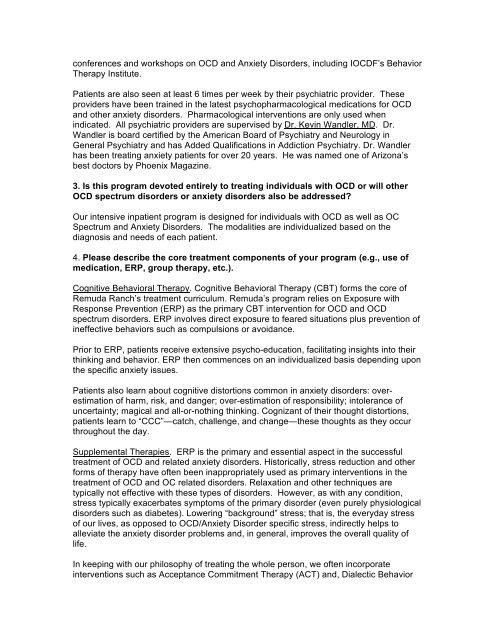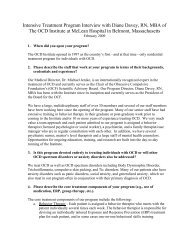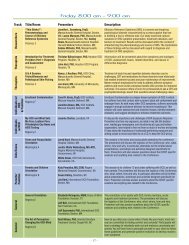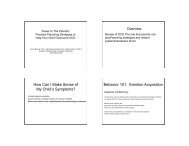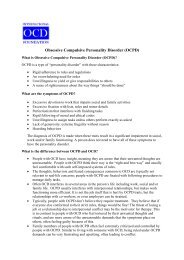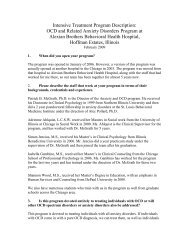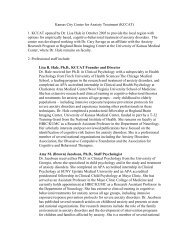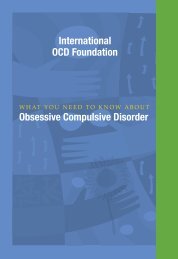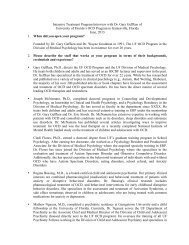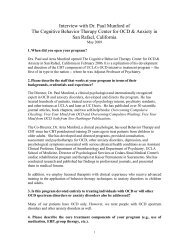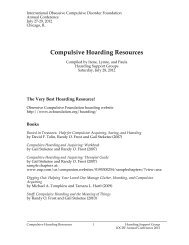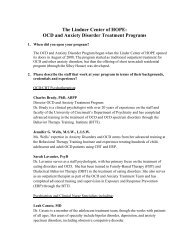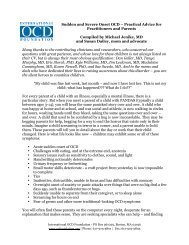When Did You Open Your Program? - Obsessive-Compulsive ...
When Did You Open Your Program? - Obsessive-Compulsive ...
When Did You Open Your Program? - Obsessive-Compulsive ...
You also want an ePaper? Increase the reach of your titles
YUMPU automatically turns print PDFs into web optimized ePapers that Google loves.
conferences and workshops on OCD and Anxiety Disorders, including IOCDF’s Behavior<br />
Therapy Institute.<br />
Patients are also seen at least 6 times per week by their psychiatric provider. These<br />
providers have been trained in the latest psychopharmacological medications for OCD<br />
and other anxiety disorders. Pharmacological interventions are only used when<br />
indicated. All psychiatric providers are supervised by Dr. Kevin Wandler, MD. Dr.<br />
Wandler is board certified by the American Board of Psychiatry and Neurology in<br />
General Psychiatry and has Added Qualifications in Addiction Psychiatry. Dr. Wandler<br />
has been treating anxiety patients for over 20 years. He was named one of Arizona’s<br />
best doctors by Phoenix Magazine.<br />
3. Is this program devoted entirely to treating individuals with OCD or will other<br />
OCD spectrum disorders or anxiety disorders also be addressed<br />
Our intensive inpatient program is designed for individuals with OCD as well as OC<br />
Spectrum and Anxiety Disorders. The modalities are individualized based on the<br />
diagnosis and needs of each patient.<br />
4. Please describe the core treatment components of your program (e.g., use of<br />
medication, ERP, group therapy, etc.).<br />
Cognitive Behavioral Therapy. Cognitive Behavioral Therapy (CBT) forms the core of<br />
Remuda Ranch’s treatment curriculum. Remuda’s program relies on Exposure with<br />
Response Prevention (ERP) as the primary CBT intervention for OCD and OCD<br />
spectrum disorders. ERP involves direct exposure to feared situations plus prevention of<br />
ineffective behaviors such as compulsions or avoidance.<br />
Prior to ERP, patients receive extensive psycho-education, facilitating insights into their<br />
thinking and behavior. ERP then commences on an individualized basis depending upon<br />
the specific anxiety issues.<br />
Patients also learn about cognitive distortions common in anxiety disorders: overestimation<br />
of harm, risk, and danger; over-estimation of responsibility; intolerance of<br />
uncertainty; magical and all-or-nothing thinking. Cognizant of their thought distortions,<br />
patients learn to “CCC”—catch, challenge, and change—these thoughts as they occur<br />
throughout the day.<br />
Supplemental Therapies. ERP is the primary and essential aspect in the successful<br />
treatment of OCD and related anxiety disorders. Historically, stress reduction and other<br />
forms of therapy have often been inappropriately used as primary interventions in the<br />
treatment of OCD and OC related disorders. Relaxation and other techniques are<br />
typically not effective with these types of disorders. However, as with any condition,<br />
stress typically exacerbates symptoms of the primary disorder (even purely physiological<br />
disorders such as diabetes). Lowering “background” stress; that is, the everyday stress<br />
of our lives, as opposed to OCD/Anxiety Disorder specific stress, indirectly helps to<br />
alleviate the anxiety disorder problems and, in general, improves the overall quality of<br />
life.<br />
In keeping with our philosophy of treating the whole person, we often incorporate<br />
interventions such as Acceptance Commitment Therapy (ACT) and, Dialectic Behavior


